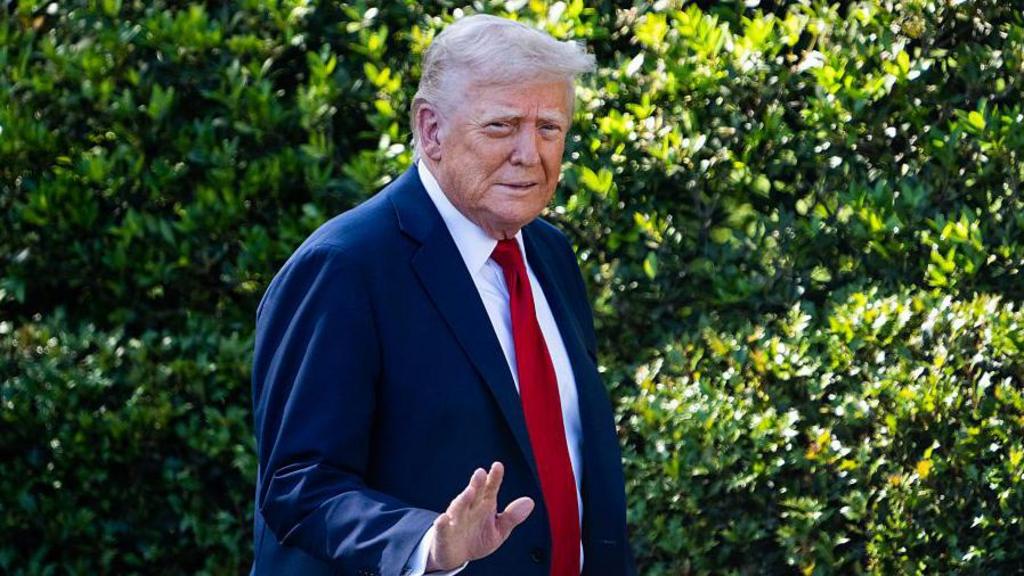US President Donald Trump has approved an executive order aimed at alleviating the effects of recently implemented tariffs on the automotive sector, following rising concerns over increased costs and the risk of disruptions in sales and manufacturing.
The directive enables automakers operating US-based plants to reduce the import duties they pay on foreign components, utilizing a calculation based on their US car sales and pricing structures.
White House officials indicated the policy will grant companies a two-year period to adjust and restructure their supply chains.
Officials also clarified that automotive parts produced in Canada and Mexico, when compliant with North American free trade agreements, will remain exempt from tariffs—a waiver previously described as temporary.
The announcement coincided with President Trump’s visit to Michigan on Tuesday for a rally marking his first 100 days in office.
Michigan is home to the Detroit Three—Ford, General Motors (GM), and Stellantis—as well as an extensive network of more than 1,000 industry suppliers.
These firms and the broader industry have experienced heightened uncertainty since the March announcement of new 25% tariffs on vehicles and parts, a move the White House defends as necessary for strengthening domestic manufacturing and protecting national security interests.
Following the tariffs’ introduction, auto sales initially surged as consumers sought to purchase vehicles before higher prices took effect, but businesses now face complex adjustments.
Before the latest update, General Motors and other manufacturers expressed support for measures intended to reduce the economic impact of these tariffs.
“We are grateful to President Trump for his commitment to the US automotive sector and the millions whose livelihoods depend on our industry,” GM CEO Mary Barra commented in a statement.
“We value our constructive engagement with the President and his team and look forward to ongoing collaboration,” she added.
On Tuesday, General Motors also informed investors of the need to revise its annual forecast and withdrew previous financial guidance amid these policy shifts.
Notably, GM postponed its scheduled analyst call to discuss quarterly earnings results in light of the recent changes.
The new tariffs on imported vehicles—which accounted for nearly half of US car purchases last year—took effect last month.
Duties on imported auto parts were poised to be implemented beginning 3 May.
Under the revised framework, manufacturers can offset the tariff costs on car parts, with deductions valued up to 3.75% of the retail price of US-assembled vehicles, with that figure dropping to 2.5% in the following year.
The proportion would decrease as the two-year transition period continues.
Administration officials stated that vehicles manufactured with at least 85% of their parts sourced from the US, Canada, or Mexico would be fully exempt from tariffs—a threshold that rises to 90% in the second year.
This policy reflects the interconnected nature of global automotive supply chains, where products branded as American-made often include significant foreign-sourced components.
The White House added that companies would not be subject to overlapping penalties, confirming that new auto tariffs will not be compounded with existing duties on steel and aluminum.
In public remarks before signing the order, President Trump characterized the easing of measures as minor, stressing it applies to a “very, very small part of the car,” and reiterated his intention to support companies with domestic operations.
“This is designed to help them through a short-term transition period,” the President remarked.
Last week, a coalition of American automotive trade groups requested that the administration reconsider tariffs on imported parts.
In a letter to the White House, organizations representing manufacturers such as GM, Toyota, and Volkswagen argued that the new levies would “result in higher consumer prices, reduced dealership sales, and greater expense in servicing and repairing vehicles.”
Ford also voiced its support for the President’s decision, saying the adjustment would “help mitigate the effects of tariffs on automakers, suppliers, and consumers.”
“We remain committed to working closely with the administration to advance a robust and expanding US auto sector,” the company statement affirmed.
Ford highlighted the importance of policies supporting exports and accessible supply chains as “crucial” for encouraging domestic industrial growth.
“The participation of major vehicle importers in Ford’s commitment to US manufacturing could yield a significant rise in assembly plants, supplier facilities, and employment,” the company added.
John Elkann, chairman of Stellantis, also welcomed the tariff concessions, echoing the collaborative spirit of industry peers.
“We are eager to continue partnering with US officials to reinforce a competitive automotive industry and promote American exports,” said Elkann.
Fifty years after the conclusion of the Vietnam War, Southeast Asia’s economic trajectory continues to demonstrate strong growth and emerging prosperity.
US President Donald Trump and Prime Minister Mark Carney held discussions following Canada’s general election.
The Clayborn Temple in Memphis, Tennessee, served as the central organizing location for Martin Luther King Jr.’s final campaign in 1968.
A closely followed murder trial in the US has entered a second phase after the initial proceedings ended in a mistrial.
Below are selected questions we’ve addressed, as answered by our experienced journalists and correspondents.

